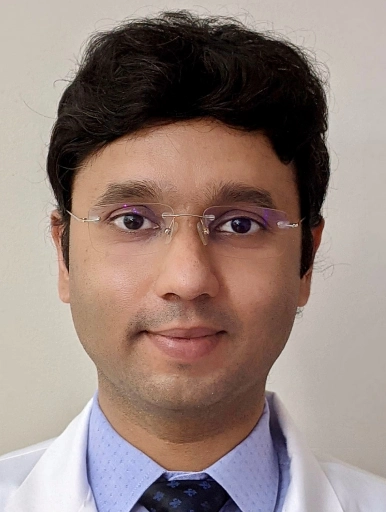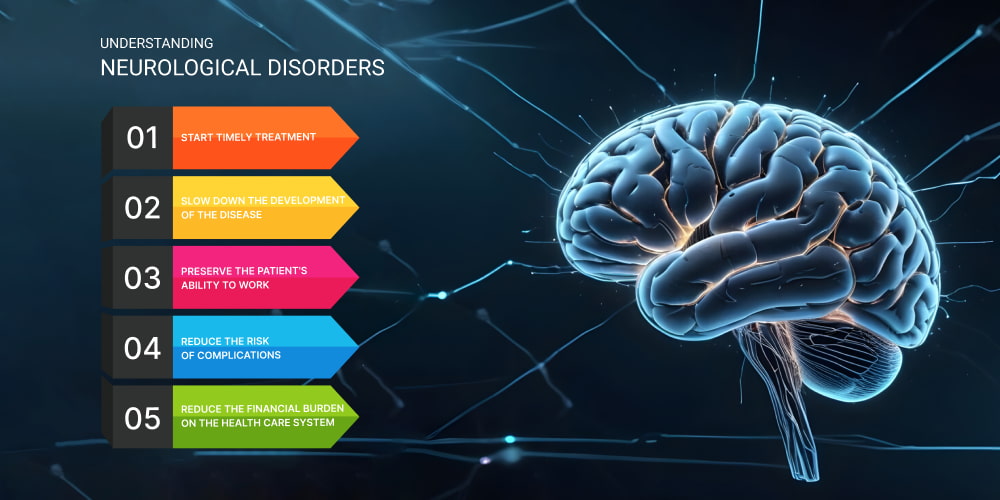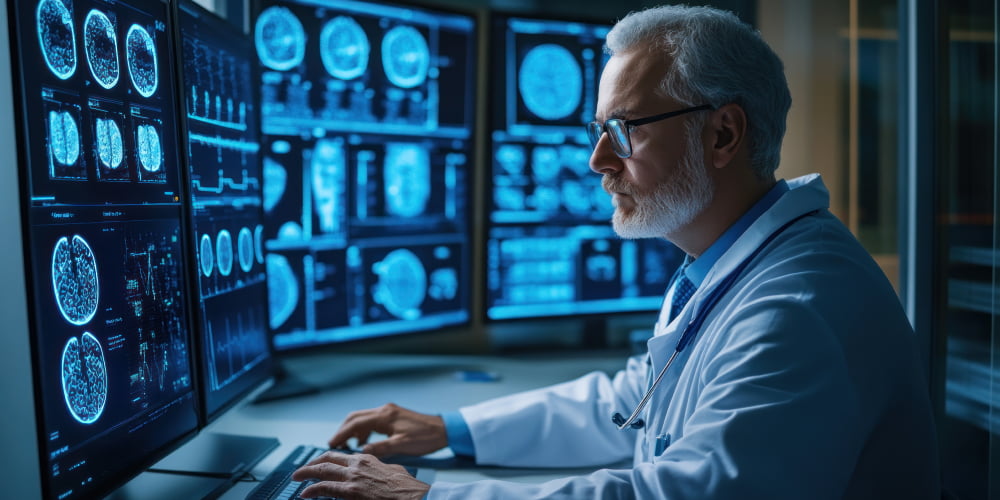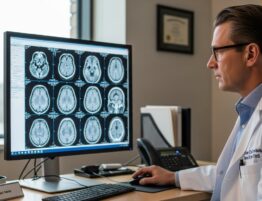In today’s world, early diagnosis of neurological disorders is becoming an increasingly important public health task. Every year, the number of people suffering from various neurological disorders is steadily increasing. That is why timely detection of the first signs of the disease plays a key role in the successful treatment of patients.
AI in healthcare opens new horizons in the field of diagnostics. Modern technologies make it possible to process huge arrays of medical data and identify patterns. These can indicate the development of a disease long before the onset of obvious symptoms. It is especially important when dealing with complex conditions such as neurological disorders.
The use of artificial intelligence in diagnosis offers several significant benefits:
- Significant reduction in the time it takes to make a diagnosis
- Increased diagnostic accuracy due to the analysis of a large amount of data
- Possibility to detect diseases at early stages
- Reducing the burden on medical personnel
- Reducing the number of diagnostic errors
The Intersection of AI and Healthcare: A New Frontier
AI in healthcare is rapidly evolving and becoming an integral part of modern medicine. Machine learning enables the creation of increasingly sophisticated diagnostic algorithms. They learn from millions of medical records and images. These systems can recognize subtle deviations from the norm, which may indicate the beginning of disease development.
The process of training artificial intelligence models involves several steps:
- Collecting and processing a large amount of medical data
- Data partitioning by experienced specialists
- Training algorithms on the marked-up data
- Validation of results on independent datasets
- Continuous improvement of models based on new data
Among the current brain imaging technologies, the following are particularly notable:
- Computer vision systems for analyzing medical images
- Neural networks for processing medical records
- Disease prediction algorithms
- Medical decision support systems
Understanding Neurological Disorders: The Need for Early Diagnosis
Neurological disorders represent a wide range of conditions affecting the nervous system. Early diagnosis of conditions such as Alzheimer’s disease and Parkinson’s disease is particularly important. In the case of these diseases, time is of the essence – the earlier treatment is started, the greater the chance of slowing the progression of the disease and preserving the patient’s quality of life.
Identification of symptoms and data analysis in the early stages allows you to
- Start timely treatment. It makes it possible to use more gentle therapy methods and prevent irreversible changes in the nervous system. At early stages, the body responds better to drug treatment, and the effectiveness of therapy is much higher.
- Slow down the development of the disease. This means that with early intervention, it is possible to reduce the disease progression rate significantly. Modern treatment methods can significantly slow down the destruction of nerve cells. You will be able to preserve the functionality of the brain for a longer period.
- Preserve the patient’s ability to work. It is extremely important for maintaining a person’s quality of life. Early symptom detection allows you to preserve professional skills, social activity, and the ability to self-care longer. It is critical to the patient’s psychological well-being.
- Reduce the risk of complications. It is achieved through the timely initiation of preventive measures and control over disease development. Early diagnosis can prevent or minimize serious complications such as speech, movement, and cognitive impairment.
- Reduce the financial burden on the health care system. This is because early treatment is less costly than treatment of advanced cases. In addition, preserving the patient’s ability to work reduces social benefits and care costs.
Challenges in Traditional Diagnostic Methods
Classical methods of diagnosing neurologic disorders face several significant limitations. Traditional approaches often require prolonged patient follow-up and may miss early signs of disease. In addition, human error can lead to diagnostic errors.
Machine learning in healthcare can overcome these limitations due to:
- The ability to process huge amounts of data
- Lack of fatigue when analyzing information
- The ability to take into account many factors at once
- The ability to identify non-obvious patterns
- Continuous self-learning and improved diagnostic accuracy
AI Techniques Revolutionizing Early Diagnosis
Machine learning and brain imaging are becoming key tools in modern neurological diagnostics. Artificial intelligence algorithms can analyze various types of data, including:
- MRI and CT scans of the brain
- Electroencephalogram results
- Genetic data
- Medical history
- Cognitive test results
AI-assisted data analysis enables the detection of subtle changes in brain structure and function that may indicate disease progression. Modern AI platforms use sophisticated algorithms to process and interpret medical information.
Among the most promising tools are:
- Neural networks for analyzing medical images
- Disease prediction systems
- Platforms for analyzing genetic data
- Tools for monitoring cognitive functions
Enhancing Symptom Detection with Machine Learning
Machine learning significantly increases the efficiency of symptom detection of neurological disorders. Algorithms can notice the slightest deviations in a patient’s behavior, changes in test results, or medical images. This is especially important for diseases that develop gradually and may go undetected for a long time.
AI-based continuous monitoring systems allow you to:
- Track the dynamics of a patient’s condition in real-time
- Identify trends in changes in health indicators
- Predict possible disease progression
- Adjust treatment plans promptly
- Evaluate the effectiveness of therapy
The Future of AI in Neurological Care
The development of AI in healthcare opens new perspectives in the diagnosis and treatment of neurological disorders. Shortly, we can expect to see even more advanced systems capable of:
- Predict disease progression based on genetic data
- Create personalized treatment plans
- Automatically adjust therapy based on patient response
- Predict potential complications
- Optimize drug dosages
Analyzing data using artificial intelligence will become increasingly accurate and efficient. This will improve the quality of diagnostics and significantly reduce the cost of medical care.
In conclusion, the introduction of AI technologies in neurological diagnostics represents a revolutionary step in the development of modern medicine. Early diagnosis using AI can significantly improve the prognosis for patients with neurological disorders and increase the effectiveness of their treatment. As technology advances, we will see more and more widespread implementation of artificial intelligence in various aspects of healthcare. This will undoubtedly lead to an improvement in the quality of medical care and increase its accessibility for patients around the world.













Please, leave your review
Write a comment: